Androsace chamaejasme is another plant with circumpolar distribution, and ranging into Eurasia. It's common here in the upper montane and alpine zones and does well in the rock garden or trough, too.
The common names - sweet-flowered androsace, rockjasmine - hint at another of its attributes... although it does take some hunkering-down to appreciate its pleasant perfume.

Comments
Mark McDonough
Re: Sweet-flowered Androsace (Androsace chamaejasme)
Fri, 02/26/2010 - 8:03pmLori, I love the last photo, like a marmot, poking their heads up above the rocks. I haven't grown this fine plant but hope to one day.
Richard T. Rodich
Re: Sweet-flowered Androsace (Androsace chamaejasme)
Sat, 02/27/2010 - 9:06pmIndeed a charmer. What do you suppose is the pH of that tarn rock (am I using the term correctly?).
Lori S. (not verified)
Re: Sweet-flowered Androsace (Androsace chamaejasme)
Sat, 02/27/2010 - 9:36pmI couldn't tell you the actual pH that groundwater in contact with the rock would have, but I would expect it to be pretty basic, as the rock in the photos is limestone, and limestone is exposed at surface over vast areas here. It's either the Palliser or Banff Formation (ouch, I feel I should know this... must get myself a map) which are both very thick and thus form extensive outcrops. The front ranges of the Rockies in Alberta are, in fact, predominantly limestone. (The garden photo, however, shows what I jokingly refer to as my crevice garden, in which the rocks are siliceous siltstone, i.e. not calcareous.)
A tarn is a glacially-carved lake, i.e. a lake in a cirque, often filled by snowmelt. :)
Trond Hoy
Re: Sweet-flowered Androsace (Androsace chamaejasme)
Sun, 02/28/2010 - 6:00am"Tarn" is the same word as Norwegian "tjern, tjoern"! Meaning small lake.
Lori S. (not verified)
Re: Sweet-flowered Androsace (Androsace chamaejasme)
Sun, 02/28/2010 - 10:29amI don't believe the plant is sensitive to pH, particularly, although that is something perhaps others could comment on.
Sellars (not verified)
Re: Sweet-flowered Androsace (Androsace chamaejasme)
Wed, 03/03/2010 - 7:43pmLori:
Your garden plant looks terrific. I have tried Androsace chamaejasme and failed. Maybe I should try again. :-\
Lori S. (not verified)
Re: Sweet-flowered Androsace (Androsace chamaejasme)
Wed, 03/03/2010 - 9:41pmThank you! I'll definitely try to collect seed... although, in last year's photos, I did not notice signs of pollination - no colour change in the flower eye - assuming that is reliable... ?
Todd Boland
Re: Sweet-flowered Androsace (Androsace chamaejasme)
Fri, 03/05/2010 - 6:13amUse a small brush to 'pretend' you are a bee!
I tried this species too with no luck but then I generally don't do well with Androsace except for primuloides and sempervivoides.
Lori S. (not verified)
Re: Sweet-flowered Androsace (Androsace chamaejasme)
Sat, 11/10/2012 - 9:33amA few more photos of a lovely species, in the wild:
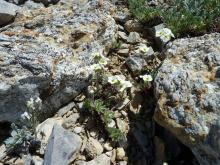
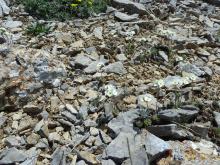
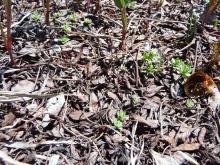
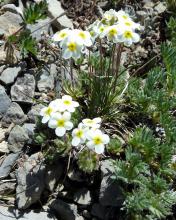
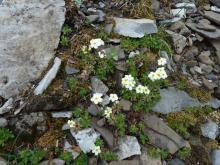
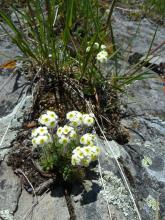
And in the garden - in bloom and showing its typically brilliant fall colour:
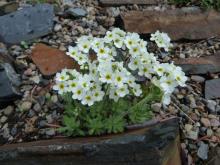
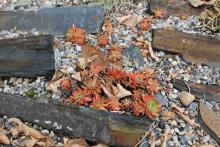
Trond Hoy
Re: Sweet-flowered Androsace (Androsace chamaejasme)
Sat, 11/10/2012 - 9:51amVery lovely indeed, Lori!
I have grown it on a few occasions but it is always shortlived with me :(
Some very nice rocks too, especially in the first picture! Do I spot a piece of conglomerate in between the lichen covered rocks of quarts (near the edge)?
Lori S. (not verified)
Re: Sweet-flowered Androsace (Androsace chamaejasme)
Sat, 11/10/2012 - 11:02amYes, you have a sharp eye, Trond! That photo is from Forgetmenot Ridge in Kananaskis, one of our favourite (though gruelling) hikes. The highest part of the ridge is capped by a boulder field of quartz and chert pebble conglomerate slabs. I'm embarrassed to say that I don't know what formation it is. If there are any local geologists out there who know, please pipe up!
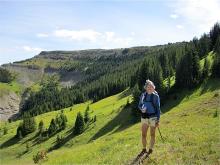
The conglomerate supports a fascinating growth of lichen - bright green and black, with some orange. Walking through the boulder field about a kilometer or so out to the true summit is fun and interesting... must watch one's step to avoid twisting an ankle, though, and I imagine the lichen gets slippery in wet conditions.
I'm describing the area along the crest in the upper left of this photo. (NB. I think may be the only photo of myself that I've ever posted here that's a close enough view to make out that I'm actually a humanoid. ;D)
It's a beautiful area, with views off to the plains to the east and of the mountain ranges to the west:
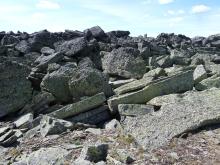
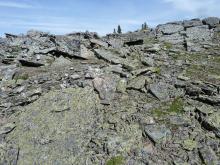
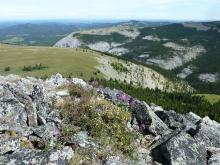
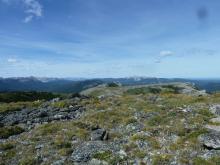
cohan (not verified)
Re: Sweet-flowered Androsace (Androsace chamaejasme)
Sat, 11/10/2012 - 4:35pmA fave of mine as well, I'll have to add some photos from some very different sorts of sites as well (don't think my internet connection is strong/fast enough to try now)- in the Kootenay Plains at not very high elevations in grassy areas...
I love the expansive views in your last shots, Lori. Its funny, second to last image in thumbnail looks as though there is a person kneeling in the rocks...lol
Trond Hoy
Re: Sweet-flowered Androsace (Androsace chamaejasme)
Sun, 11/11/2012 - 3:06amThanks Lori, nice to meet you ;) I love that kind of landscape although it is tough to the feet as you say.
Richard T. Rodich
Welcome to the forum, Jesonko
Tue, 07/21/2015 - 7:22amWelcome to the forum, Jesonko!
Thanks for joining in. Alpines are truly the best of the best, in our opinion!